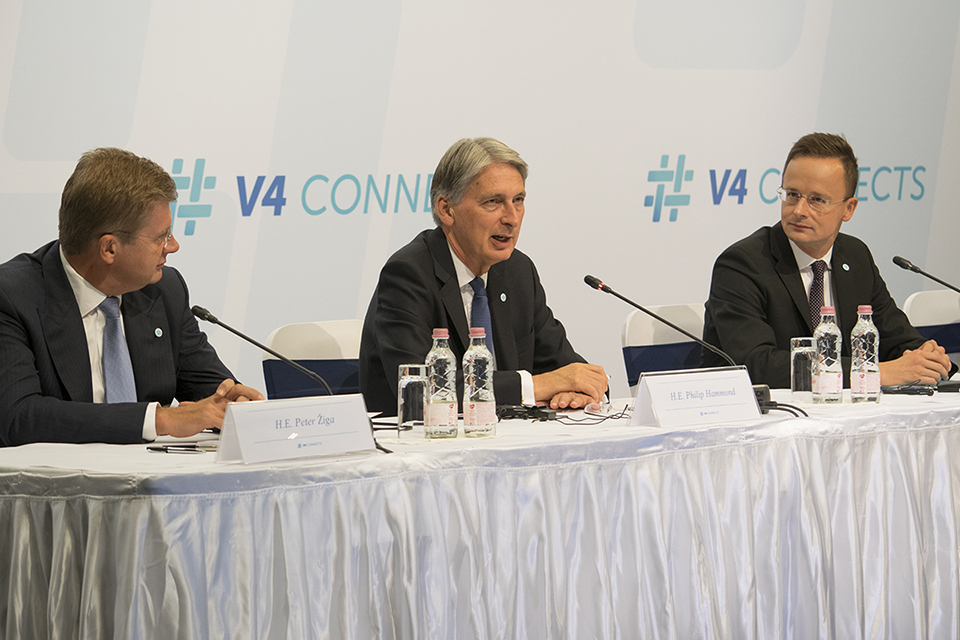Chancellor's statement at the Visegrad 4 summit
The Chancellor of the Exchequer, Philip Hammond's statement at the Visegrad 4 summit in Budapest, Hungary.

Well thank you Péter [Szijjártó] and can I start by thanking you and your colleagues for hosting us here today, and thank you to all the Visegrad ministers for the invitation, it’s a great honour to be invited to take part in this meeting.
This is my second V4 summit. We met in Bratislava in 2014. We met then because we are a group of countries with many interests in common, and a common approach to solving the challenges that face us in the modern world.
And we meet again today for the same reason with our four close allies, the Czech Republic, Slovakia, Poland and our hosts Hungary, and I hope we will go on working closely together as a group of countries with common interests.
I am here today to reiterate the UK’s strong commitment to our future relationship with the V4, and also to understand the priorities and concerns of other V4 member states through our discussions. Our links with the Czech Republic, with Hungary, Poland and Slovakia are already strong and deep. Over the past decades British businesses have forged trusted partnerships and established strong links with companies across all of your countries.
Major British companies like Rolls-Royce and BP have a significant presence particularly in the Czech Republic and Hungary. Nearly 1 in 10 of all Slovakian vehicle exports come to the UK. There are many major UK financial services companies that have offices and branches operating in Poland, which is one of our key trading partners.
In total the bilateral trade between the UK and the Visegrad 4 is already worth more than £31 billion sterling every year. We want to build on that. We want to ensure that we deliver an even closer economic relationship between our countries, to the benefit of all our peoples.
Today at our summit meeting we discussed the future of these vital economic links and of course we discussed that against the backdrop of the Brexit negotiations that are going on in Brussels. We looked at scenarios for post-Brexit trade, investment and financial relations as the UK moves towards our exit from the EU in March 2019.
As Peter said in his introductory remarks we respect the European Union negotiating process. So the negotiations will be conducted in Brussels.
But of course we want to keep abreast of the thinking, the ideas, the views and the concerns of our allies and partners across the European Union.
And we want to maintain the strong bilateral relationships which we have with all the countries of the European Union as we go forward.
The UK government is clear that we will remain an outward looking and business friendly trading nation as we have always been. We want to reach a deep and special partnership with the European Union that will ensure that European companies have the maximum freedom to trade with and operate within the UK market, and for British businesses to be able to do the same in Europe, across goods and services. Achieving this means that there is a smooth predictable pathway for our exit from the European Union. We want to give businesses on both sides of the English channel and both sides of the Irish border the confidence that they will not face a cliff edge when we leave the EU.
That’s why we are proposing a time limited transition period so that we can provide that certainty that our borders continue to operate smoothly and that our businesses can continue to supply their customers and our citizens can carry on with their day to day lives across the continent of Europe.
Beyond that our exit from the EU will not change our position as an advocate for free trade and global cooperation.
We start of course from a unique position with regulatory frameworks and standards that exactly match because of our membership of the European Union. So we are not in the position of any other third country negotiating a trade deal. We have perfect regulatory alignment on day one. Therefore we think that rather than looking at any other models, Switzerland, Norway, Canada, we should start to design a bespoke model for our future relationship which recognizes the high degree of alignment that we have. And that will deliver mutually beneficial customs arrangements, trade arrangements, investment arrangements, supporting our objective for tariff free trade and frictionless borders between our countries.
Today’s talks have focused on the economic relationship between the UK and the V4, but our common interests go far beyond economics. We want a continued partnership on foreign policy, on security and development and on defence. We are committed to a deep and special partnership with the European Union and with the countries in it and we are committed to the security of our friends and allies on the eastern front of NATO as we have always been. We’ve had a very positive and productive discussion today and I’m grateful to my colleagues for being so welcoming and so open in this informal summit. I come with this message, that the UK will continue to be a truly consistent friend of central Europe. And I look forward to working closely with all of you to ensure the mutual prosperity of our people.